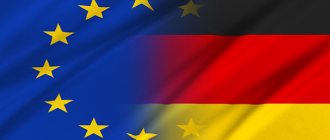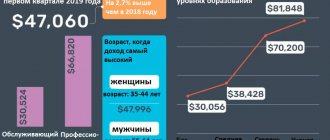Briefly about currency
First of all, it should be noted: although Bulgaria is part of the EU, it still has its own currency – the lev. Previously, it was tied to the exchange rate of the German mark, and after the introduction of the euro, the country's government established that 1 euro is just under 2 levs. The exchange rate does not change, and therefore, for simplicity, in the future, salaries in Bulgaria, if necessary, will be immediately indicated in euros.
The transition to the single European currency is planned for January 2012, but the 2008 crisis and some other economic problems in Bulgaria prevented this. As of mid-2020, there are discussions about the introduction of the euro, but no one has yet announced the exact date. Moreover, there are even disagreements regarding how the name of this currency will be written (in Bulgaria they use Cyrillic): “euro” - or “euro”?
Thus, while living and working in Bulgaria, you will still have to receive a salary and pay for goods or services in the local currency - levs.
Entertainment
Cinema ticket - 11 levs (400 rubles)
Dinner in a restaurant - from 30 levs (1,100 rubles)
Basically, locals have fun like this: they go to restaurants and cafes, sit there in a large group, and when the establishment closes, they move to some night bar or club. But the clubs in Sofia cannot be compared with those in Moscow: Bulgarians like to hang out to music for an hour and go home to sleep, so usually by three o’clock in the morning the clubs are empty and they close. Club opening days are only Friday and Saturday; on Sunday almost all establishments are closed. Entrance can be either free or quite expensive - from ten to 100 leva (360–3,600 rubles).
Bulgarians like to hang out to music for an hour and go home to sleep, so usually by three o’clock in the morning the clubs are empty and they close
There are cinemas in almost every shopping center; a ticket costs an average of 11 leva (400 rubles). There are a lot of restaurants - for every taste and budget. Dinner can cost from 30 to 300 leva (1,100–10,900 rubles). The most expensive thing on the menu is usually alcohol, but in stores the same wine can be sold several times cheaper. In Sofia, I can recommend a good chain restaurant “Victoria”, a fast food chain Happy, a beer restaurant Ale House, an establishment with national cuisine “Pod Lipite”.
There are a lot of museums in the country; you won’t be able to visit them all in a lifetime. After all, this is a country with a very rich history, and artifacts from different periods are still found here. There are a lot of activities related to nature in Bulgaria: locals go to the sea, mountain biking, skiing and snowboarding, diving, Nordic walking and hiking. Here, in general, many people lead a healthy lifestyle, yoga and fitness are popular, and now it has become fashionable to learn to dance folk dances - the Bulgarian choro.
cover: Przemysław Szabłowsk – stock.adobe.com
Average salary in Bulgaria in 2020
The Bulgarian currency is the lev (BGN), which, despite membership in the European Union, has not been replaced by the euro. This unit of account continues to operate and its exchange rate is gradually stabilizing, after some fluctuations in the economy since the early 90s. Today, 100 BGN is exchanged as 51 Euros, as 57 US dollars or 3639.28 rubles.
The National Institute of Statistics calculates the average income of citizens. The indicator is calculated monthly in comparison with the same months of the previous year and published on the official website of the organization.
In 2021, the average salary was 1135, in 2021 - 1123 leva. The economic ratio of the minimum and average wages (Kaitz index) for 2021 is 49%.
Minimum and maximum salary in 2019
The average level of income of citizens in this country is low in comparison with other EU countries. However, it is much higher than in the CIS countries. Experts predict that the new economic policy adopted in the state will lead the country's residents to a high quality of life by 2021 and will attract a large number of migrants to its territory.
Over 5 years, the average wage in Bulgaria has increased by more than 10%. This is due, first of all, to the country’s economic growth and stable GDP per capita. As of 2021, the minimum wage in Bulgaria is 260 euros. The hourly wage cannot be lower than 3.07 levs (local currency units).
The average salary in the state depends on the specific region of residence. In Sofia and in resorts it is 5 times higher than in provincial towns and villages. The average income of residents of the capital is 609 euros. In other regions – 500 euros.
According to statistics, only 20% of local residents received higher education. In this regard, there is a shortage of qualified personnel in the state. The government attracts foreigners to work by offering them decent earnings. The most in demand are specialists working in the field of information technology. They earn from 1500 euros.
Salary levels in different industries
Each sector in Bulgaria has a fixed salary threshold. There is a noticeable difference among regions. If we take the average value, the picture looks something like this:
- Programmers are considered the leaders in wages in Bulgaria. Information technology specialists are highly valued here. The average salary of a good programmer starts from 2300 levs (85.5 thousand rubles).
- Workers in the field of information technology and communications are slightly behind IT specialists. According to the National Statistical Institute, the average wage in this sector is set at about 1,985 levs (74 thousand rubles). To this it is worth adding an annual bonus in the amount of one salary, or in our opinion the 13th salary.
- The energy sector continues to hold its position, paying its employees an average of 1,570 levs (58.5 thousand rubles). Salaries in the banking and insurance sectors are almost nearby - 1,517 levs (56.5 thousand rubles).
- The average salary of workers in the extractive industries is 1,300 levs (48.4 thousand rubles)
Both Russians, Ukrainians, and Belarusians can find work in Bulgaria and receive a good salary to live in the country. Among foreigners there will always be those who want to immigrate to Bulgaria.
| Profession | Salary, euro/month |
| Doctor | 600 |
| Nanny | 400 |
| Guide | 450 |
| Housemaid | 300 |
| Teacher | 390 |
| Engineer | 1300 |
| Nurse | 475 |
| Welder | 400 |
| Programmer | 750 |
| Electrician | 800 |
| Police officer | 490 |
| Mining worker | 680 |
| Salesman | 350 |
| Firefighter | 500 |
| Public transport driver | 420 |
| Lawyer | 750 |
| Driver | 470 |
| Accountant | 500 |
| Builder | 400 |
| Loader | 250 |
| Dentist | 700 |
| Taxi driver | 500 |
Next come the industries in which earnings do not exceed 1 thousand leva:
- Civil servants of the administration - 950 levs (35.3 thousand rubles).
- Real estate – 920 levs (34.2 thousand rubles).
- Social and health care spheres – 830 levs (30.8 thousand rubles).
- Transport, logistics – 772 levs (28.7 thousand rubles).
- Education – 760 levs (28.2 thousand rubles).
- Car repairs – 752 levs (28 thousand rubles).
- The sphere of culture and sports - 683 levs (25.4 thousand rubles).
- Travel companies, recruitment agencies – 675 levs (25 thousand rubles).
- Agriculture – 658 levs (24.5 thousand rubles).
We recommend reading: Work and vacancies in Bulgaria for Russians, Ukrainians and Belarusians in 2021
By the standards of Bulgarian residents, 784 levs are considered average earnings. For comparison, deputy salaries are almost 3.5 times higher than the average earnings of an ordinary resident.
How much does it cost to live in Bulgaria Costs and salaries in 2021
Bulgaria is an eastern country of the European Union with a developed tourism sector. This country cannot be called promising for work and life. Mostly people who move here are planning to open a business in the field of catering or tourism. This also applies to wealthy citizens who dream of living in a quiet place near the sea. In all other cases, Bulgaria cannot be called an excellent place to live, find a well-paid job and move. How much does life cost in Bulgaria in 2021? How much money do local residents spend on food, rent, utilities and transportation?
Is this country living well by European standards? Unfortunately, it cannot be called a prosperous state. We recently wrote in detail about living costs and salaries in Montenegro. These countries are similar in terms of income and average monthly expenses. Except for the fact that the cost of living in Bulgaria is still lower than in Montenegro. It is considered one of the lowest among all EU countries. The two main disadvantages include the relatively low standard of living and low wages. By EU standards they are very low.
Let's look at the main costs:
- Food. Monthly expense for a family of 2 people is 200 €.
- Rent a one-room apartment. In the center of large cities in Bulgaria, an apartment with a 1-room area of 40 square meters can be rented for 235-270 € per month. In residential areas – 166-180 € per month.
- Utility payments for electricity, water, gas, garbage removal. For an apartment of 40 sq.m. you will pay about 35-40 €.
- Transport. Public transport ticket – 26 € per month. One trip on public transport will cost 0.82 €.
- Additional expenses for Internet and mobile communications. About 30 € per month. Unlimited Internet – 8-10 € per month. Mobile communications: 1 minute of conversation costs 0.12-0.15 €.
Total monthly costs start from 457 €
Living costs are 100 € less than in Montenegro. However, in Bulgaria, wages are 100 € lower. If we compare these indicators, then in these European resort countries the standard of living is incredibly similar.
How much do they earn in Bulgaria in 2021?
Average wages remain one of the lowest in the European Union. Considering that living costs in Bulgaria are not as high as in many Eastern and Western European countries, the average income is quite enough to cover the above costs. The average net income in the country is 458 € per month. Unfortunately, this income is not enough for a good life. If we take into account all the listed costs, then the population has practically no free money left.
The highest incomes were recorded in the capital Sofia. Here the average net income is fixed at 543 € per month.
Average salary in Bulgaria by economic sector
| Industry | Salary, lev/month | Salary, euro/month |
| Information and communication | 2584 | 1320 |
| Financial and insurance activities | 1801 | 920 |
| Supply of electricity, gas, steam and air conditioning | 1721 | 880 |
| Mining | 1642 | 840 |
| Professional, scientific and technical activities | 1592 | 815 |
| Public administration | 1205 | 615 |
| Health and social work | 1100 | 560 |
| Education | 1033 | 530 |
| Transportation and storage | 992 | 505 |
| Production | 971 | 495 |
| Wholesale and retail trade | 947 | 485 |
| Arts, entertainment and recreation | 942 | 480 |
| Real estate transactions | 938 | 480 |
| Water supply, sewerage and waste management | 895 | 460 |
| Administrative and support services | 874 | 445 |
| Fisheries, Agriculture and Forestry | 829 | 425 |
| Construction | 820 | 420 |
| Accommodation and meals | 655 | 355 |
| other services | 768 | 395 |
Note. * Information is based on official data from the National Statistical Institute of Bulgaria as of the first quarter of 2021.
Average salary in the country
Of course, to correctly answer the question of what the salary is in Bulgaria, it is not enough to consider only the legally established minimum wage. In practice, this amount per month is earned mainly by representatives of professions that require the lowest level of qualifications, while the majority of citizens still have a noticeably higher level of income.
To roughly estimate the level of salaries of Bulgarians, you can use the average salary calculated monthly by the country's National Institute of Statistics. As of the beginning of 2021, this figure is 1077 leva per month, which is approximately 550 euros.
This is more than 5 times lower than the average income of the French (2,957 €) and Germans (2,867 €), and almost 2 times lower than in Romania (1,003 €) and Hungary (1,054 €). The average salary in Russia is slightly higher than in Bulgaria (560 €). But Ukrainians and Moldovans earn almost one and a half times less per month than Bulgarians (290 and 310 euros, respectively).
However, it is not worth talking about Bulgaria as a poor country, since low wages by European standards are compensated by very low prices for food and utilities (the cost of these services has shown a steady decline in recent years), as well as low taxes.
Therefore, if we consider the average income taking into account PPP (purchasing power parity), then in Bulgaria it turns out to be even slightly higher than in Hungary (1,400 and 1,200 US dollars, respectively) and is approximately at the level characteristic of the Russian Federation.
By major cities ascending
| Name | € per month |
| Shumen | 220 |
| Dobrich | 300 |
| Sliven | 310 |
| Ruse | 340 |
| Pleven | 360 |
| Burgas | 415 |
| Varna | 425 |
| Plovdiv | 450 |
| Stara Zagora | 480 |
| Sofia | 610 |
Payment by region
| City | Average monthly salary, euro |
| Sofia | 580 |
| Stara Zagora | 480 |
| Plovdiv | 450 |
| Varna | 425 |
| Burgas | 415 |
| Pleven | 360 |
| Ruse | 340 |
| Sliven | 310 |
| Dobrich | 300 |
| Shumen | 220 |
Minimum salary in Bulgaria in 2020
The Council of Ministers of the Republic of Bulgaria approves the minimum wage rate (minimum wage), in accordance with which the minimum wage threshold is established. According to the Labor Code, the employer is obliged to pay remuneration to employees, taking into account its minimum amount. The minimum wage established by the Government is divided by frequency into:
- hourly;
- daily;
- weekly;
- monthly.
In 2021, the average monthly wage rate is 560 leva (20,379 rubles). For comparison, the minimum rate in Russia is 1.8 times less.
In 2021 the minimum salary was 510 BGN per month (3.07 per hour), and in 2021 460 BGN (2.77 per hour).
Minimum wages announced in European countries
In January, the minimum wage was below 600 euros per month in eastern Europe and above 1,500 euros in the north-west. LIGA.net reports this with reference to the Eurostat press service.
In nine other countries it ranges from 400 to 600 euros per month: Latvia 430 euros, Romania 466 euros, Hungary 487 euros, Croatia 546 euros, Czech Republic 575 euros, Slovakia 580 euros, Estonia 584 euros, Lithuania 607 euros and Poland 611 euros.
Minimum wage indicators by country of the world
The official minimum wage in countries around the world is established at the legislative level and is set per hour, day, week or month. And in the developed countries of the European Union - Austria, Denmark, Cyprus, Italy, Finland and Sweden - the minimum wage is not established at all, as it is regulated by intersectoral collective agreements. Industry agreements determine wages for individual professions.
The table shows the calculation of the minimum monthly salary based on 160 working hours per month, which is given by the Eurostat statistics service. The indicators are indicated without deducting due taxes and contributions, social benefits paid by the employer.
Minimum wages in different countries of the world in 2021:
| A country | Minimum payment per month |
| Belgium | €1593 |
| Bulgaria | $286 |
| Germany | €1557 |
| Luxembourg | €2071 |
| Poland | €523 |
| France | €1521 |
| Great Britain | €1451 |
| Czech Republic | €518 |
| China. Set by local authority separately for each province | average value - $300 |
| Hong Kong | $750 |
| Israel | $1499 |
| Panama | $744 |
| Uruguay | $460 |
| Lithuania | €555 |
Eastern Europe is inferior to Western Europe in terms of minimum wages. Bulgaria has the lowest minimum wage, although compared to Russia it is almost twice as high as Russia. Luxembourg has the highest minimum wage, followed by Belgium and Germany.
When comparing indicators, it is worth considering that living in Europe is more expensive than in Russia. For example, the amount of taxes on real estate and the cost of utilities are several times higher than in the Russian Federation. One hundred euros in Russia can buy more cheap products. Travel by public transport will also be cheaper (in Amsterdam a weekly pass costs 35 euros = 2,590 rubles), as will gasoline for car owners.
But you can’t focus only on prices, although some of them in the Russian Federation are cheaper than European ones. But the average salary of Russians is 6 times lower than the global one. Even such developing countries as Malaysia, Chile, El Salvador and China have overtaken Russia.
According to the ILO (International Labor Organization), residents earn the most on average (indicators in US dollars):
- Norway - 7050;
- Australia - 5200;
- New Zealand - 4700;
- USA, Germany - 4500;
- Canada - 3600;
- Japan - 3400;
- France - 3400;
- Italy - 3200.
Residents of the Scandinavian countries, Western Europe, the USA and Canada, and representatives of the Commonwealth of Australia have a high average monthly salary.
But in fact, citizens of these countries receive a smaller amount in their hands, since high taxes are calculated. So, in Norway, after deducting taxes, which amount to almost half of the salary, you will receive approximately $3,000. The same can be said about Australia. But in New Zealand, a gentle tax gradation has been established that provides many benefits. Therefore, the average New Zealander will receive about the same amount in hand.
In Germany, instead of $4500, they receive only $2800 net. But since 2015, a minimum wage law has been adopted there, which cannot be set below $10 per hour. Therefore, Germans who earn $1200–1700 are considered low-income, and if they earn $1100, they are considered to be living below the poverty line. For Russians, this salary is considered above average.
New Zealand 4700;.
Pension provision
For social security, the payment percentage is 18.3%, with the employee's share being 7.94% and the employer's share being 10.36%. As for pension payments, their value is 5% of the amount of income, and the employee gets only 2.2%. An employee, while carrying out work activities, makes these contributions on a regular basis, and upon retirement receives pension benefits. Its average size depends on salary, region, length of service and ranges from 500 euros per month.
An employee, while carrying out work activities, makes these contributions on a regular basis, and upon retirement receives pension benefits.
Average salary in Bulgaria
The situation with average wages in Bulgaria is slightly better than with minimum wages. That is, the lag behind other EU members is very noticeable. To some extent, the gap is compensated by lower prices for food and rent. Therefore, quite often foreigners seek to obtain a Bulgarian residence permit on conditions not related to official work, but on another basis, for example, after purchasing real estate.
According to the Bulgarian National Statistical Institute, before taxes, the average salary in Bulgaria in 2021 is 1,036 levs per month , or 525 euros. After all mandatory deductions, the employee has about 400 euros left at his disposal. Fortunately, the income tax rate in Bulgaria is only 10%.
In addition, the level of remuneration in Bulgarian companies depends on qualifications, experience, profession, industry and region. For example, the average salary in Sofia exile is 1413 leva (720 euros), in Varna - 977 leva (495 euros), and in smaller settlements - Vidin and Haskovo - around 330-370 euros.
The salary in Bulgaria for highly qualified specialists is 1140 leva (585 euros), unskilled workers receive 631 leva (320 euros). In the public sector, the average income is 1023 leva (520 euros), and in the private sector - 1040 (530 euro). The highest salaries in Bulgaria are recorded in the South-West region - 1,279 levs (650 euros), and the lowest in the North-West - 816 levs (415 euros).
The highest salaries in Bulgaria are recorded in the South-West region 1,279 levs 650 euros, and the lowest in the North-West region 816 levs 415 euros.
Maximum
Higher education in Bulgaria is rare - only 20% of residents have graduated from universities. This can play into the hands of foreign specialists and gives them a chance to get a good job with decent monetary remuneration for their professional activities.
Representatives from the field of information technology are considered the most in demand specialists - working in this field, you can count on a salary that is astronomical for Bulgaria - one and a half thousand euros (more than three thousand leva). But there is an abundance of people who want to work in the restaurant business (especially during the season of influx of tourists), so this is where they will pay the cheapest salary - provided that they are lucky enough to get a job there.
How much money from the Bulgarian budget was spent on increasing salaries in 2021?
From January 1, 2021, the minimum wage in Bulgaria, according to the state budget, rose to 420 levs (15,628 rubles). Also this year, the government increased spending on social benefits and pensions by 413 million leva. The minimum pension is planned to be increased from July 1 to 161 levs.
At the same time, the Bulgarian Cabinet of Ministers decided to raise the salaries of university teachers by 6%, increasing budget expenditures by 2 million levs.
The government promises that prices for goods and services will rise by less than 0.5%. Thus, the authorities confirmed their intention, albeit slowly, to improve the well-being of citizens.
Income of citizens
According to official data, the average salary before taxes this year is 1,192 levs (43,600 rubles) per month, low - 720 levs (26,300 rubles), and high - 2,882 levs (105,400 rubles). In fact, there are earnings both lower and higher than these. Personally, I know people who earn 500 levs (18,200 rubles) working in a stall, and managers in international companies who are paid 17 thousand levs (620 thousand rubles).
If you believe the statistics, they earn the least in tourism, and the most in the IT sector. Workers and construction specialties are in demand: Bulgaria has not yet stopped building real estate. People who don’t have enough work or don’t like local salaries go to Western Europe to work.
The Bulgarian style of work is to exert as little stress as possible: finish the working day, leave the office threshold, turn off the phone
At the beginning of the year, local television reported on the salaries of the Bulgarian President and officials. Deputies have a salary of 3,800 levs (139 thousand rubles), those who participate in commissions - from 4,300 levs (157,300 rubles), the prime minister - 5,900 levs (215,800 rubles), and the president - 7,600 levs (278 thousand rubles). But for some reason it seems to me that this is not all of their income.
In Bulgaria, labor legislation is familiar to us: everyone works eight hours with lunch breaks, five days a week, there are professions with a rotating and shift schedule. It is believed that the Bulgarian style of work is to exert as little stress as possible: finish the working day, leave the office threshold, turn off the phone. Of course, there are other people, everything is very individual here.
Unemployment rate and migrants' prospects
Unemployment rates vary by region. In the capital of Bulgaria and resort towns it is extremely reduced, but in the periphery and in small towns it is almost impossible to find a job with decent pay.
In 2021, the official unemployment rate fell to 5.6%, down from 11% in 2015.
We recommend reading: Is Bulgaria a member of the European Union and Schengen in 2020
The level of wages in Bulgaria leaves much to be desired. However, given the affordable prices for products and other services necessary for a normal existence, Bulgaria is a rather attractive country to live in.
Salary level
Bulgaria is a member of the European Union, but despite this it has retained its own currency - the lev (BGN). The exchange rate set by the authorities has remained almost unchanged for several years: 1 lev is equal to 0.51 euros (plus or minus 20 euro cents). All payments in the state are made in national currency.
Minimum wage in Bulgaria
The minimum wage is set by the Council of Ministers of the republic. This indicator is reviewed annually. Depending on it, the size of the pension, taxes, and social benefits are established.
The minimum hourly wage has also been established - 3.07 leva. As you can see, the level of wages is constantly growing, but at the same time it still remains one of the lowest in Europe.
In 2021, the minimum wage is projected to be 287 euros or 560 leva (an increase of almost 10% compared to 2021).
Average wages in Bulgaria
Average salaries differ depending on education, place of work, region of residence, length of service, specialty, etc. Pay varies throughout the year.
These are official statistics. According to other data, only about 40% receive a salary from 500 to 1000 leva, and 35% have an income of the minimum wage.
Income distribution occurs approximately as follows:
Salary by specialty
There are a sufficient number of trained personnel in Bulgaria, but the level of training lags somewhat behind the European one. Only 20% of the population has a higher education (although the number of students receiving it has now increased). At the same time, the country experiences an acute shortage of specialists in the IT, energy and financial sectors. People working in these areas receive the highest salaries.
The lowest salaries are in the tourism business and construction. On average, they receive 335 and 420 euros, respectively.
Salary level by region
Salaries by city and region also vary greatly. In large and resort cities, the income of the population is several times higher.
At the same time, the cost of living in higher-paid regions is noticeably higher.
Work for local and visiting residents
The rules for getting a job in Bulgaria are simple: preference is given to workers who live in this country. Russians and Ukrainians, as well as residents of Eastern European countries, are hired only if local residents do not apply for it. In addition to specialties related to agricultural activities, most specialties require knowledge of the English language.
Tourism is an active sector in the economy, since Bulgaria has a good climate and convenient geographical location. Visitors get jobs as animators, administrators, trainers in hotels, etc. The pay for such professions is low and is suitable for people without special qualifications. There is very little competition in this industry, which makes it possible to realize your potential. It is better to look for work in popular resorts.
IT specialists are also quite in demand - to get a job you only need to speak English and have a qualification. Work in this country is paid a little lower than in other countries, but it can give a good impetus for development and career growth. It is better to look for work in Sofia, Plovdiv, Burgas. For those who do not know the Bulgarian language, it is advisable to find a job in a company in the capital.
Transport
A metro ride in Sofia - 1.6 levs (58 rubles)
Taxi ride to the coast - from 10 levs (360 rubles)
Sofia has everything: metro, trolleybuses, buses, trams, minibuses and taxis. City transport is constantly updated, there are ramps for strollers, air conditioning, Internet and chargers for gadgets. One trip on the metro, if you buy a card at the entrance, will cost 1.6 levs (58 rubles). In other large cities, only ground transport operates, but there are very small non-tourist settlements where there are not even taxis. The country has a developed network of roads, intercity buses, and railways. Planes fly between Sofia, Varna and Burgas.
There are no taxi aggregators in Bulgaria, and Uber did not allow the local taxi drivers’ union to enter the market, but each service has its own mobile application. Again, due to high competition, the cheapest taxi is in Sofia. The price starts from 69 stotinki (25 rubles) per kilometer, that is, you can travel the entire city for 20 levs (730 rubles). On the coast and in the mountains in high season, taxis are much more expensive: per kilometer they can charge 1.5 or three leva (54–109 rubles). But if you only need to travel a couple of kilometers with suitcases, then the tourist will not be charged according to the meter, but will simply announce the price of ten or 20 leva (360–730 rubles).
There are a lot of cyclists here, but infrastructure for them began to be created only a couple of years ago. Still, most Bulgarian cities are very ancient, with narrow, crooked streets. There is sometimes no room for a pedestrian to squeeze through, not to mention cyclists.
Average starting point for foreigners
Unfortunately and to the disappointment of labor migrants, the unemployment rate in the country is high - the number of officially registered unemployed exceeds the number of jobs twice, so first of all, a job will go to a Bulgarian or someone who has Bulgarian citizenship. Applicants from other countries can only count on getting a job if they have a lower salary or even unofficial employment.
Even in large cities, they will receive much less for their work, regardless of the quality of their duties. The only winners are the indigenous population. In Bulgaria in 2021, guest workers receive approximately 300 euros per month, mostly all of them work in the tourism sector - hotels, restaurants, bars and entertainment. As mentioned above, under the same working conditions, the holder of a Bulgarian passport will receive about 600 euros. The difference is obvious.
Salary per month by profession in 2018
The average monthly salary in Bulgaria, depending on the specialty, is as follows (prices are in euros):
| Profession | Salary, euro/month |
| Doctor | 600 |
| Nanny | 400 |
| Guide | 450 |
| Housemaid | 300 |
| Teacher | 390 |
| Engineer | 1300 |
| Nurse | 475 |
| Welder | 400 |
| Programmer | 750 |
| Electrician | 800 |
| Police officer | 490 |
| Mining worker | 680 |
| Salesman | 350 |
| Firefighter | 500 |
| Public transport driver | 420 |
| Lawyer | 750 |
| Driver | 470 |
| Accountant | 500 |
| Builder | 400 |
| Loader | 250 |
| Dentist | 700 |
| Taxi driver | 500 |
Minimum
Wages in Bulgaria have recently increased by 25% - this is actively promoted by the steady growth of GDP and economic growth of the country. The minimum salary in Bulgaria in 2021 is 260 euros (510 leva). In some companies, hourly wages are common, the amount of which is regulated by law, and it cannot be lower than 3.07 leva.
Minimum salary in Bulgaria
Translated into euros, the amount is tiny, but most often the residents of Bulgaria do not suffer from this - having a European passport, they have the opportunity to move to more developed countries and receive high wages for the same work, so migrants from poor countries agree to the minimum wage, for whom a salary of one and a half euros per hour will be a real salvation and will feed the whole family.
Average
The average salary in Bulgaria depends on the region in which the employed person lives.
Average salary in Bulgaria
The highest salaries are in the capital and large resort cities - sometimes it exceeds the provincial salary by more than 5.5 times. In Sofia, the capital of Bulgaria, the approximate salary is 610 euros (1200 leva), in the regions - 300 euros.
Average starting point for foreigners
Unfortunately and to the disappointment of labor migrants, the unemployment rate in the country is high - the number of officially registered unemployed exceeds the number of jobs twice, so first of all, a job will go to a Bulgarian or someone who has Bulgarian citizenship. Applicants from other countries can only count on getting a job if they have a lower salary or even unofficial employment.
The national currency of Bulgaria is the Bulgarian Lev.
Even in large cities, they will receive much less for their work, regardless of the quality of their duties. The only winners are the indigenous population. In Bulgaria in 2021, guest workers receive approximately 300 euros per month, mostly all of them work in the tourism sector - hotels, restaurants, bars and entertainment. As mentioned above, under the same working conditions, the holder of a Bulgarian passport will receive about 600 euros. The difference is obvious.
Maximum
As statistics say, Why do we need higher education? Education and workHigher education is rare in Bulgaria - only 20% of residents have graduated from universities. This can play into the hands of foreign specialists and gives them a chance to get a good job with decent monetary remuneration for their professional activities.
High salaries in Bulgaria
Representatives from the field of information technology are considered the most in demand specialists - working in this field, you can count on a salary that is astronomical for Bulgaria - one and a half thousand euros (more than three thousand leva). But there is an abundance of people who want to work in the restaurant business (especially during the season of influx of tourists), so this is where they will pay the cheapest salary - provided that they are lucky enough to get a job there.
Payment by region
Let's take a closer look at wages in the regions of Bulgaria, and in some cases very significantly:
| City | Average monthly salary, euro |
| Sofia | 580 |
| Stara Zagora | 480 |
| Plovdiv | 450 |
| Varna | 425 |
| Burgas | 415 |
| Pleven | 360 |
| Ruse | 340 |
| Sliven | 310 |
| Dobrich | 300 |
| Shumen | 220 |
Does it make sense to look for a job?
Moving to Bulgaria and getting a job there makes sense primarily for those Russians who are professionally involved in programming and electronics. These professions are in demand there. The rest should think about whether they need this move: as is easy to see, the average earnings in this country are even less than in Russia.
However, it must be taken into account that you can live normally in Bulgaria on about 280 euros per person per month - that is, about 19 thousand rubles. This amount includes utilities, medicine, food, and household goods. Even by Russian standards this is acceptable. In addition, it is difficult to evaluate such things as climate in monetary terms: Bulgaria is a world-famous resort.
Average cost of living in Bulgaria
In large Bulgarian cities (Sofia, Varna and Plovdiv), the food basket is practically no different from the basket of a Moscow resident. Bread in Bulgaria can be bought for 35 rubles, 1 kg of beef - for 400 rubles, 1 kg of potatoes - 39 rubles. In Bulgaria, food prices are not much lower than in Russian cities.
It is believed that housing in Bulgaria is much cheaper than in Russia. For example, in order to purchase housing by the sea, you only need 20 thousand euros.
However, there is one drawback - high costs for telephone and apartment maintenance. For example, telephone payments can be more than 1.5 thousand rubles per month.
The average salary in Bulgaria is approximately the same as in Russia – 30 thousand rubles. The state has established a minimum wage of 12 thousand rubles. Bulgaria receives its main income from tourism, so it is very difficult to find work there. It is much easier for indigenous residents to get a job than for newcomers.
What does the change in the minimum wage mean for a foreigner?
In order to correctly submit documents for a residence permit in Bulgaria, it is important for a foreigner to know the local minimum salary and pension.
Already in 2021, to extend the stay for 6 months, a foreign guest must have 2520 leva (minimum wage × 6) in his account. For an annual stay, 5040 levs must be in the bank (minimum wage × 12).
A foreign pensioner with an increase in the Bulgarian minimum pension to 161.38 levs needs to have 968.28 levs in his bank account (based on 6 months of residence), and 1936.56 (based on 12 months).
How can foreign citizens get a job in Bulgaria?
To work in Bulgaria you need to obtain a work permit. This document is issued for 1 year; if necessary, the permit can be extended. Without this document, companies will not hire a foreigner.
No later than 3 months you can obtain a residence permit. A foreign citizen must contact the Bulgarian National Employment Agency and also submit a separate package of documents.
See also: Sale of collateral: procedure 2021
An employer, when hiring a foreign citizen, must give reasons why this particular candidate is being hired, and also argue that there is no suitable candidate for the proposed vacancy in the local market.
The most popular way to find a job in Bulgaria is to use personal connections and acquaintances. That is, relatives or friends who live in the country can help you find a job. According to statistics, most jobs on the Bulgarian labor market are filled this way.
If you have problems with dating, then you can go to Bulgaria for tourism purposes, relax at the seaside and try to make the necessary acquaintances. There are many Russian-speaking citizens in this country. However, knowledge of English and local languages will also be required.
To successfully search for a job in Bulgaria, it is better to focus on economically active cities. This is Sofia, as well as Plovdiv and Varna.
For those who decide to open their own business in the country, they impose difficult conditions that will greatly affect the income of a developing company. In a short period it is necessary to employ at least 10 people.
Expert opinion
Palkin Sergey
The average salary in Bulgaria leaves much to be desired. But given the affordable prices for products and other services necessary for a normal existence, Bulgaria is a rather attractive country to live in.
Professions in demand in Bulgaria in 2020
Bulgaria is an attractive country among emigrants; those who move can find work. Of course, the pay leaves much to be desired, but it is enough to live on.
Workers in the tertiary sector of the economy and the service sector are most in demand. The presence of a large number of hotels, inns, and restaurants entails the need for labor. In addition to wages, employees have the opportunity to receive tips.
Among the most in-demand service sector professions:
- taxi drivers;
- waiters;
- hotel administrators;
- maids;
- tour guides;
- manufacturers of souvenirs;
- sellers.
Specialists with special education also have the opportunity to get a fairly good job in Bulgaria, and having knowledge of the English language creates a competitive advantage, for example, information technology specialists.
Medical personnel, upon confirmation of their qualifications, can successfully provide medical services and work in the healthcare system.
Specialists of technical professions: plumbers, welders, installers, electricians will easily find work.
In any country, regardless of where they live, people who strive for a goal find work. Moving to another country, the need to solve problems on their own, and sometimes the need to survive, accumulate the strength of job seekers.
We recommend reading: Inexpensive real estate in Bulgaria
And in the end, everything works out well, the person achieves his goal, and his life begins to flow in a new direction.
How much do they earn in Bulgaria?
Despite the fact that Bulgaria is part of the European Union, it still has its own currency - the lev. The official rate set by the government has not changed for several years and is less than 2 leva per 1 euro.
From January 1, 2021, the Government approved an increase in the minimum wage. The minimum monthly salary in Bulgaria in 2020 is 560 levs (280 euros).
Despite the fact that Bulgaria is part of the EU, salaries are relatively low. The average salary per month is 380 euros, and the amount increases every year, but the increase is not reflected in the income of the population, because the cost of living services is rising in price.
The income of the Bulgarian population by profession can be indicated by the following amounts:
- Unskilled workers can receive from 250 euros per month.
- Working in the tourism business, you can earn from 350 euros.
- The teacher's salary in 2021 is 488 euros.
- When working in agriculture, you can expect to earn from 370 euros.
- Education workers and civil servants receive 450 euros.
- Social workers earn 470 euros.
- In the field of energy you can receive from 800 euros.
- Economists, financiers from 850 euros.
- Engineers and IT specialists are paid the most. With this profession you can earn from 1000 euros per month.
- The minimum salary for a doctor is 475 euros, the country has begun to pay more attention to healthcare.
The Bulgarian healthcare system has an analogue of Russian free medicine, but it is not available to everyone. Services are provided to local citizens, as well as foreign citizens who have managed to obtain the right to long-term or permanent residence. The country's economy is slowly but surely gaining momentum, and the state's standard of living is improving.
Despite the decline of Bulgarian industry, qualified foreign employees, usually in technical fields, who have characteristic skills and work experience, can find work in the construction and manufacturing sectors.
Expert opinion
Palkin Sergey
Seasonal work in Bulgaria is competitive and low paid. Usually, students from local universities are hired for such vacancies, and then foreign citizens. The same applies to temporary employment in the agricultural sector.
Despite the fact that Bulgaria has the lowest wages in Europe, many foreign citizens are interested in the question of what the salary is in Bulgaria. Because for residents of the CIS countries such payment seems high. According to statistics, among the local population only 20% have higher education.
This gives high-level foreign specialists a chance to get a job with a decent salary.
The average salary in Bulgaria differs depending on the region of residence. In the capital and large resort towns, average earnings are several times higher than in provincial towns.
Now salaries in Sofia are much higher than in other cities in the country. The standard of living in different regions of Bulgaria differs, but not as much as the salaries differ. So the average salary in Sofia is 1261 leva, and this is almost half more than in other cities of the country.
Sooner or later everyone loses their ability to work. In retirement, citizens should not count on high payments. The minimum pension is 200 levs. But at this level of prices for the main expenses that are established in the country, you can live on such funds.
Salary taxes
Taxation for employees in Bulgaria is regulated by the Personal Income Tax Law. The obligation applies to both employees and self-employed workers. Both Bulgarian citizens and foreign workers need to pay taxes.
Income tax
Individuals working in Bulgaria are required to pay income tax of 10%. For Bulgarian citizens, profits earned both within the country and abroad are taken into account. For foreign workers, tax is only levied on profits earned in Bulgaria.
The tax return is submitted by April 30 of the year following the reporting period. Persons who pay taxes before the due date can count on a 5% discount.
Social contributions
In addition to income tax, individuals are required to pay fees for social, medical and pension insurance. These payments are shared between the employee and the employer.
Social fees table
| Names | % of payments | employee share - % | employer's share - % |
| Healthcare | 8 | 3.2 | 4.8 |
| Pension payments | 5 | 2.2 | 2.8 |
Bulgarian legislation exempts certain types of income of citizens from taxation. These include:
- profit from the sale of shares;
- state benefits for children;
- grants provided to students studying in Bulgaria or abroad;
- student scholarships;
- income from deposits in Bulgarian banks;
- profit from the sale of real estate and movable property in cases specified in the legislation;
- state awards;
- the cost of tickets provided to the employee by the employer;
- the cost of the uniform issued to the employee free of charge;
- profit from the sale of an inheritance or gift.
Paying taxes in Bulgaria
Earnings in Bulgaria are subject to personal income tax and are regulated by law. Taxes must be paid by both self-employed citizens and employees. Payment of taxes applies not only to citizens of the country, but also to foreign citizens.
Salaried employees in Bulgaria pay a tax of 10%. Foreigners pay tax on income received in Bulgaria, while citizens pay taxes not only on Bulgarian income, but also on income received from another state.
In addition to personal income tax, citizens must pay contributions to social insurance, health care and pension insurance. Tax payment is distributed between the employer and the employee:
- 18.3% is allocated for social security (the employer pays 10.36%, the employee - 7.94).
- Health insurance takes 8% (employer - 4.8%, employee - 3.2%).
- Pension payments take 5% (employer - 2.8%, employee - 2.2%).
There is still a long way to go to reach economically developed countries...
Although wages in Bulgaria have quadrupled in 15 years, the difference between developed countries is still large. For example, the average salary in France is 2 thousand euros/month, while in Bulgaria it is 400 euros/month. It cannot be said that people in Bulgaria work less. On the contrary, the working week here is 43.6 hours, the longest in Europe. And the level of qualifications of Bulgarian specialists is in no way inferior to European ones.
According to unofficial statistics, 40% of the population already lives below the poverty line in Bulgaria. It is even profitable for foreigners (especially pensioners) to move to this country, since Bulgaria is considered the “cheapest” place to live. Regional wage disparities further exacerbate poverty. The difference in salaries in regional cities is hundreds of euros higher than in remote ones.
For example, the average salary in the capital is the highest - 1193 levs. This is twice as much as in Blagoevgrad (593 leva) and Vidin (606 leva). Sofia is considered the only region in Bulgaria where salaries are almost a third higher than the average level. Hence the massive relocation of residents of poor regions to more developed ones. This process in its own way destabilizes the country’s economy, creating the problem of overpopulation in large cities.
Hence the massive relocation of residents of poor regions to more developed ones. This process in its own way destabilizes the country’s economy, creating the problem of overpopulation in large cities.
Employment of Bulgarian citizens and visitors
Salaries in Bulgaria are much lower than throughout Europe. A 10-fold difference is a huge gap in the standard of living of the population. This is the reason why Bulgarians emigrate abroad; usually they seek to go to the USA or Canada.
It is also bad that public sector sectors depend on the state of the economy, and if a decrease in inflation is good in developed European countries, then in Bulgaria this threatens to reduce public sector salaries.
The minimum salary in 2015 became 340 levs or a little more than 12,750 rubles. For local citizens this is very little, no matter where they live, but for foreigners who have come for permanent residence, it’s the opposite: less money needs to be deposited into a bank account to register residency.
The average salary in Bulgaria in 2017-2018 is planned at 800 levs or 30,000 rubles. Even before the increase in the exchange rate of the Russian national currency, these figures corresponded to completely different values (30% less). Therefore, it could be argued that life in Bulgaria is difficult: low wages and high prices. Today it seems to us that things are better, but they are not. In fact, Bulgaria will not change its policy in the coming years, and the economy and the lives of the population will suffer from this.











